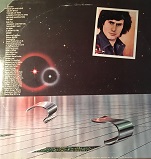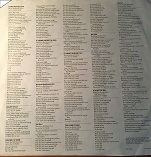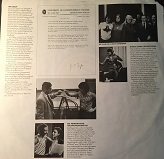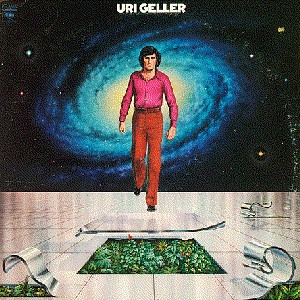The Atrocious Music Collection: #1 in a series
Artist: Uri Geller (b. 1946)
Album Title: Uri Geller
Category: Celebrity
Year: 1974
Cover art style: Polyester new-age
Audio samples: Velvet Space, I Cannot Answer You.
Acquisition: likely at the Englishtown Auction (NJ) in the mid-1980s.



Click on pictures for full-sized images
It’s probably hard for the young people today to comprehend that a guy who claimed he could bend spoons with his mind, cause broken watches to work, and might have something to do with space aliens could become a minor celebrity. The Israeli psychic Uri Geller has had a Paris Hilton-like ability to generate a lifetime of B-list fame out of precious little. It didn’t hurt that he had an arch-nemesis, something few recording artists can boast of, in magician and debunker the Amazing Randi. Geller’s 1973 appearance on the Tonight Show with Johnny Carson was one of the major momentum builders for his “career,” which is especially ironic because he was basically humiliated when he was unable to show any mental abilities on the objects the show had picked out (and not permitted him to see beforehand). The ambush worked, but had a weird boomerang effect on Geller’s fame trajectory.
A year later, he was recording an album despite having no musical ability. So it goes.
Geller relates on his website: “The idea came from German promoter Werner Schmidt. Werner originally wanted to do a musical about my life, and brushed off my claims that I couldn’t sing… until I opened my mouth to demonstrate. Horrified, he sent me to a voice coach… She was an 80-year-old woman named Lu, reputed to be able to teach anyone to sing like a lark. The best I could manage, though, was a cross between a raven and a frog. Lu advised me to talk my way through songs. She played me Lee Marvin’s hit, Wanderin’ Star: ‘His voice is much more tuneful than yours but you can copy his style.’”
Thus Geller provides vocals spoken, Shatner-like, but without Bill’s dramatic over-acting – he’s actually strangely emotionally flat for much of it. Add to that a noticeable Israeli accent (all of the songs are in English). Finally, where Shatner had the sense to sing other people’s songs (or recite dramatic works like Shakespeare) for The Transformed Man, Geller used his own poetry, which tends towards hippy-dippy lyrics like “Come on and love, love/The earth is just spinning/Time is just beginning/Days of the future/Blooming, expanding/Into the song/The song of love.”
Others go full-on spacey (“Floating in deep, velvet, black space”) or talk about bending spoons and starting watches again: “Let’s pick up something/Maybe a fork, a spoon or a key/Now concentrate/Drift you mind into believing deeply.” Yes, that is a song lyric. There is also a sort-of love song, This Girl of Mine and two other more personal, angst-filled tunes, My Son and This Lonely Man, but most of these are solidly 70s new-age-space-is-cool-expand-you-mind kind of stuff.
My favorite lyric is in Velvet Space, when Geller simple declares, “Oh God, you’re so big and strong,” a theologically sound statement in nearly every religion.
The music was written by two people. The classical pianist Byron Janis wrote about half the songs. Fun fact: Byron is married to Gary Cooper’s daughter, Maria, who introduced Geller to her husband in 1972. The other half of the music was written by Del Newman, who also did the arrangements. Newman had worked as an arranger for Paul McCartney, Cat Stevens, Elton John and Paul Simon. Two songs feature singer Maxine Nightingale in lieu of Geller’s narration.
Look, it’s kind of hard to overstate how bad this is. We’ve already dealt with the lyric-content and Uri’s delivery. The music has about as much personality as a wet rag, or a broken watch. There are soaring choruses, lots of strings, soft-rock drums, and a definite emphasis on piano (Janis), but it’s not even memorably bad. The ear-worm rating on this is as low as it gets with atrocious music, so I’m confident you can listen without any permanent damage.
The artist Beck included samples from the album in his Planned Obsolescence, and apparently “praised” the record: “I picked this up on vinyl in the early ‘90s and it was a favorite to listen to while we were recording Odelay.”
Geller’s trademark shtick was that he had no special abilities, and he wanted to prove that by having you, the viewer/listener at home also try to bend a spoon with your mind, or find some old broken clock in your closet and yell “work” at it until it started ticking again. And ultimately, that’s the ethos of the atrocious music collection: that actual musical ability – or even simply good taste – is not a requirement for making a record. Indeed, anyone can do it, and here’s all the proof you need.
Geller writes, “I truly believe nothing like it has ever been made," and I certainly agree. I’m also totally cool with keeping it that way.

